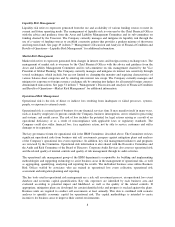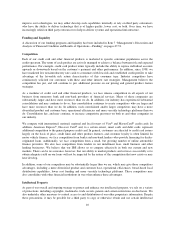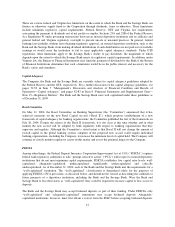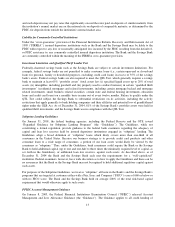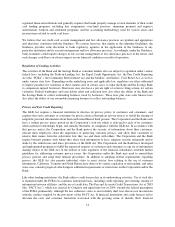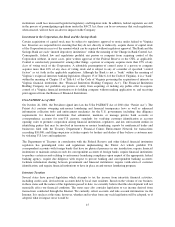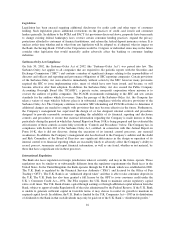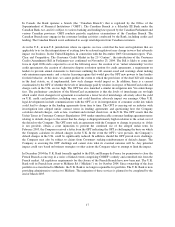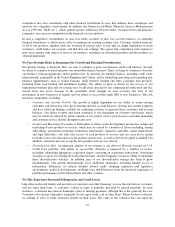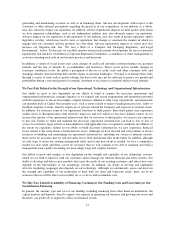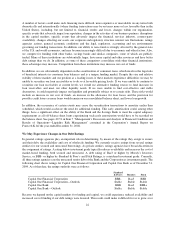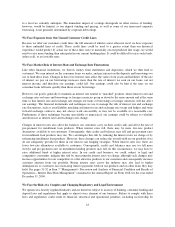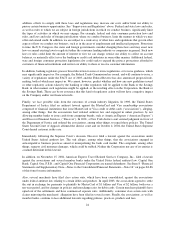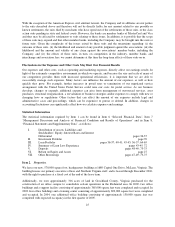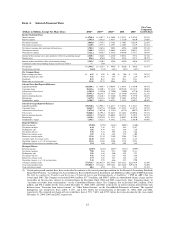Capital One 2004 Annual Report Download - page 40
Download and view the complete annual report
Please find page 40 of the 2004 Capital One annual report below. You can navigate through the pages in the report by either clicking on the pages listed below, or by using the keyword search tool below to find specific information within the annual report.In Canada, the Bank operates a branch (the “Canadian Branch”) that is regulated by the Office of the
Superintendent of Financial Institutions (“OSFI”). The Canadian Branch is a Schedule III Bank under the
Canadian Bank Act, and it is subject to various banking and lending laws passed by the Canadian Parliament and
various Canadian provinces. OSFI conducts periodic regulatory examinations of the Canadian Branch. The
Canadian Branch may engage in the consumer lending activities conducted by the Bank, including credit card
lending. The Canadian Branch is not authorized to accept retail deposits from Canadian customers.
As in the U.S., in non-U.S. jurisdictions where we operate, we face a risk that the laws and regulations that are
applicable to us (or the interpretations of existing laws by relevant regulators) may change in ways that adversely
impact our business. In the United Kingdom, in connection with the December 2003 Government report, “Fair,
Clear and Competitive: The Consumer Credit Market in the 21st Century”, the introduction of the Consumer
Credit (Amendment) Bill in Parliament was confirmed on November 23, 2004. The Bill is likely to come into
force in April 2006 and is expected to cover the following areas: the creation of an “unfair relationship” test for
credit agreements, the creation of alternative dispute resolution options for credit agreements, a requirement on
lenders to provide annual statements to borrowers outlining the full amount owed and warnings about making
only minimum repayments, and a stricter licensing regime that would give the OFT new powers to fine lenders
for their behavior. At this time, we cannot predict the extent to which the provisions of the draft bill will remain
in the final statute, or, if implemented, how such changes would impact us. In addition, there is a current
examination by the OFT of whether the levels of interchange paid by retailers in respect of MasterCard credit and
charge cards in the U.K. are too high. The OFT has also launched a similar investigation into Visa interchange
fees. The preliminary conclusion of the MasterCard examination is that the levels of interchange are too high
which could, if not changed or if agreement is reached on a lower level of interchange, adversely affect the yield
on U.K. credit card portfolios, including ours, and could therefore adversely impact our earnings. Other U.K.
legal developments include communications with the OFT as to its interpretation of consumer credit law which
could lead to changes in the lending agreements from time to time. The OFT is carrying out an industry wide
investigation into alleged unfair contract terms in lending agreements and questioning how the Company
calculates default charges, such as late, overlimit and returned check fees, in the U.K. The OFT asserts that the
Unfair Terms in Consumer Contracts Regulations 1999 render unenforceable consumer lending agreement terms
relating to default charges to the extent that the charge is disproportionately high in relation to the actual cost of
the default to the Company. The OFT must seek an agreement with the Company to change its practice or, if this
is not possible, obtain a court injunction to prevent the continued use of the alleged unfair term. In
February 2005, the Company received a letter from the OFT indicating the OFT is challenging the basis on which
the Company calculates its default charges in the U.K. In the event the OFT’s view prevails, the Company’s
default charges in the U.K. could be significantly reduced. In addition, should the OFT prevail in its challenge,
the Company may also be subject to claims from Customers seeking reimbursement of default charges. The
Company is assessing the OFT challenge and cannot state what its eventual outcome will be. Any potential
impact could vary based on business strategies or other actions the Company takes to attempt to limit the impact.
In December 2004 the U.K. Bank formally applied to the FSA and Banque de France for permission to close the
French Branch as one step in a series of linked events comprising COBEP’s orderly and controlled exit from the
French market. All regulatory requirements for the closure of the French Branch have now been met. The U.K.
Bank sold its French loan assets to Médiatis SA (“Médiatis”) on 1st October 2004. Since ownership of the loan
portfolio was transferred to Médiatis, the U.K. Bank is no longer responsible for portfolio. The U.K. Bank is now
providing administrative services to Médiatis. The migration of these services is planned to be completed by the
end of March 2005.
17



